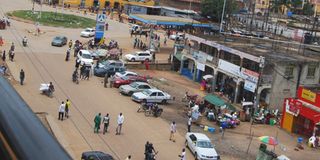Prime
How gangs give Arua City sleepless nights

Rhino Camp Road, one of the areas that offers safe haven for thugs. The area is insecure for travelers in Arua City. PHOTO/FELIX WAROM OKELLO
What you need to know:
The gangs reportedly move on motorcycles to trail unsuspecting people, especially visitors. When they approach their target, they slow down, snatch their valuables such as phones and bags, and dash at a break-neck speed into their hiding.
Residents of Arua City are living in fear over organised gangs terrorising them, especially at night.
The gangsters are reportedly spread out in the various outskirts of the fast-growing city. The hotspots include Asuru Cell near the airfield, Wadriff Road, Rhino Camp Road stretching to Arua Primary School, Hospital Road, Kirabu areas, Adriko Cell, Mvaradri areas, and Ediofe Centre.
The organised gangs have known leadership structures in groups such as Fire Eaters, Manya Boys, Air Japan, Janjaweed, Jobless Billionaires, Chicken Cannot Pass, The Gaza Boys, and Above the Law Boys, among others. These have reportedly made life difficult for both residents and visitors during day and night.
Investigations by this publication indicate that after these gangs steal items such as motorcycles, phones, and laptops, they sell and share money with their leaders.
The stolen motorcycles are primarily sold in DR Congo and South Sudan ranging from Shs1.5m to Shs2.5m, depending on the make and condition of the motorcycle.
They reportedly remove the number plates of the stolen motorcycles at the night while crossing the borders using undesignated routes, which makes it difficult for security teams to trace them.
The gangs also move on motorcycles to trail unsuspecting passengers, especially visitors. When they approach their target, they slow down, snatch their valuables such as phones and bags, and dash at a break-neck speed into their hiding.
Ms Jennifer Abio, a resident of Ediofe Centre, said on March 2, she encountered a gang that snatched her phone as she communicated with a family member while on a motorcycle.
“As I returned from work, we passed a man carrying two boys on a numberless motorcycle. When we approached the district headquarters, the boys slowed down, one snatched my phone and they sped off. We tried chasing them with my boda boda man in vain,” she said.
Ms Abio said she now fears moving to town with anything valuable or walking alone.
“We are in a terrible situation because it is getting out of hand. The police arrest these boys and are released because sometimes they get compromised,” she alleged.
In February, an official from the Ministry of Health, who declined to be named, had just been posted to Arua to carry out research when he faced the wrath of these gangs.
“As I was communicating with my colleagues on the phone while on a boda boda, a group of three boys came riding on another motorcycle and grabbed my phone. They said this was a welcome to Arua. I was left speechless,” he said.
The residents have now taken the law into their own hands. They have resorted to burning any of the arrested suspected thugs. In the last two weeks, six suspected thugs have been burnt to death by angry residents.
The former State Minister of Internal Affairs, Mr Mario Obiga Kania, said: “When people turn to mob action, it means there is a breakage in the security system. Where do these suspects end? Why are they released and they return to haunt the communities? Are the police compromised? A deliberate effort must be in place to ensure that people are safe.”
The insecurity evokes memories of the early 1990s when Arua was unsafe with the emergence of several gangs who killed and robbed people in broad daylight. The security at that time took drastic measures to eliminate such gangs.
Efforts
On April 25, the police, Uganda Human Rights Commission, and West Nile Civil Society Network organised a community baraza on the insecurity at Ondoriko Cell where the security team committed to ending the vice.
The West Nile Police Public Relations Officer, Ms Josephine Angucia, said: “We spoke to the communities on human rights, roles and responsibilities of citizens, mob action and prevention, the role of police including that of protecting and preserving human rights. We have asked the locals to report such cases to the police.”
She said victims of robberies should report to the police and follow up on the cases so that the suspects are prosecuted.
Statistics at Arua High Court in 2022, indicated that the offenses of aggravated robbery were 23, aggravated defilement were 11, and murder had 23 cases. These were cases that were followed by complainants to court.




